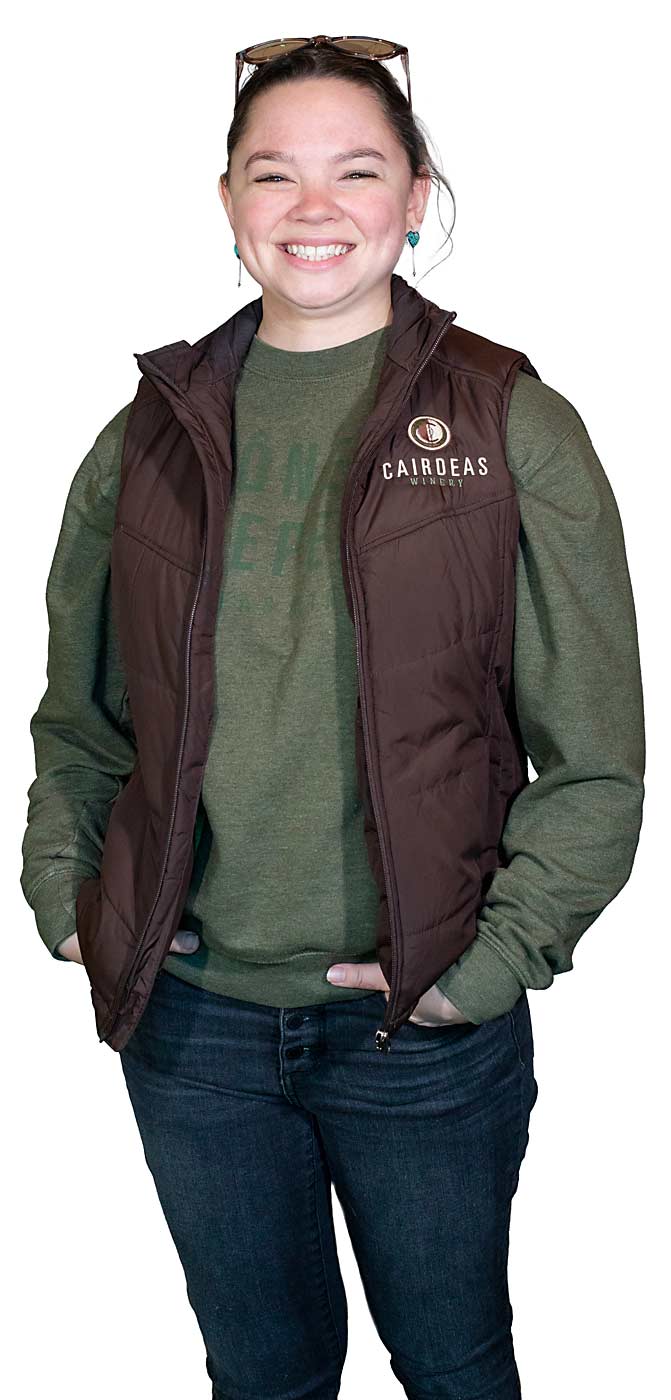family background/Miriah is the first generation in her family to work in agriculture, graduating from Yakima Valley College’s Vineyard and Winery Technology program. Her parents are Elizabeth and Raymond Falce.
age/28
hometown/Prosser, Washington
crops/grapes
business/Cairdeas Winery

Did you know you wanted to pursue a career in wine?
My family was not involved in agriculture growing up, and I didn’t want to go into agriculture. I had my mind focused on going to go live in the big city and be a scientist — I’m not going to just live in Prosser. And then I ended up living in Prosser and working in agriculture and loving it.
I loved being able to ride my four-wheeler through the vineyards out in the sun when everyone was cooped up during COVID. I can’t imagine sitting in a lab with no windows or whatever.
After getting my start in Prosser, I looked at Lake Chelan-area wineries that are hitting the wine hard and finding their craft to make their wines special and unique. I found a winery there and I remember the first time I saw the lake, I was like, I’m not going back.
How did you get your start?
My dad worked in microbiology, and I loved science. I always wanted to be like him and be a scientist. In high school, I was focused on going to school for microbiology and chemistry. When I was in college, I applied for the medical lab science program and worked in a Veterans Affairs hospital for a couple months doing tests.
I always thought that I was going to be happy being in the medical field. However, when I came back home after college, I took a job working in a tasting room. I realized that there’s science work in wine and I could use my education to go into wine.
Why did wine science win out over a medical lab career?
Working in a hospital lab is working with biohazard or bodily materials and you’re focused on safety, safety, safety. There are multiple shifts, and it’s typically a 9-to-5 kind of job, which is not the same when you’re working at a vineyard or winery. Especially during harvest, work is usually 12-hour days every day, trying to decide your picks, and when you’re going to pick.
I get to work in the vineyard from budbreak, all the way through bloom and veraison, through harvest, then I go back to the winery and make the wine out of it. My favorite thing is being able to work with all of it.
I feel like people either work in the vineyards or they work in the winery. I believe when you get to work in both, you truly understand the fruit and you understand what you’re getting.
What kind of work do you do now?
I’m tasting the grapes and testing them to get to know their numbers. I’m using basic chemistry, calculating pH, TA (titratable acidity) and sugar levels to see if they’re ripe through harvest time. I’m still running those tests even after we have the juice in the winery.
Once we have a more finished wine, I’m checking the sulfur in it, the malic acid or the residual sugar, the glucose and color tannins. There are a lot of things we can test for. We do all this testing to understand the wine that we’re making.
We do our tastings along with our data. Especially if something isn’t tasting quite right, you can kind of pinpoint it with the numbers to make the best wine that we can. I can help build a cohesive picture from vine to bottle.
What recent challenges have you been working with?
The past couple years, everyone living on the West Coast has dealt with wildfires, heat and smoke. Even if Washington wineries don’t have fires in their backyards, we’re still getting the smoke impact from Canada and California.
That smoke affects lots of aspects of the wine industry, more than just the lab results. For instance, if you’re planning to pick on a certain day but suddenly you have a smoke event happen, you’ll need to change your pick dates. In the lab, we can run microferments to learn if the grapes are going to be impacted.
So, it affects the vineyard a lot. I personally have not run any of those smoke tests for chemicals. The big labs like ETS measure those thresholds and put a number behind the level of smoke impact. Smoke has been a big issue the past couple years, and it’s not going to go away.
What advice would you give to young growers?
If you are interested in pursuing an ag degree, don’t forget to take all the other classes, and always take the science classes. Take biology, take the chemistries — chemistry is the most fun — or maybe take the art classes along with the ag and horticulture classes.
When you do that, you get a bigger picture of things that you might not know and how things can cross-apply and work together.






Leave A Comment